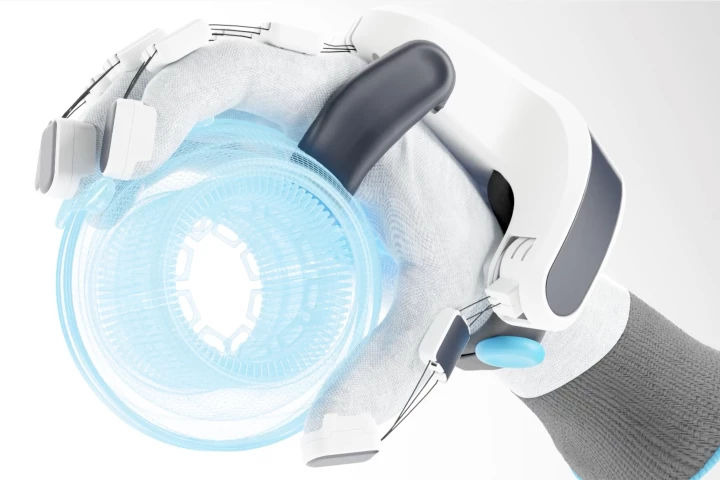Haptic
-
It’s not always to picture what’s going on while listening to sports on the radio – so spare a thought for vision-impaired people who don’t have options. Now they do: meet the OneCourt, a haptic feedback device that works like braille for sports.
-
Fluid Reality is offering a cheaper, more lightweight haptic VR glove that doesn’t need to be tethered to bulky backpacks or multitudes of tubing. It’s designed to provide users with a high-resolution VR experience, direct to their fingertips.
-
SenseGlove has announced the upcoming release of Nova 2, the second generation of its innovative haptic force-feedback glove. The Nova 2 offers a more realistic VR experience and will be the first glove of its type to feature palm feedback.
-
While technology is making strides in absorbing our eyes and ears in virtual worlds, it’s harder to engage senses like touch. Engineers have now developed WeTac, a thin, wearable electronic "skin" that provides tactile feedback to users in VR and AR.
-
Haptic feedback can give virtual experiences an extra dimension, but it’s hard to achieve. Tech startup Emerge has now unveiled the Emerge Wave-1, a device that pairs with a VR headset and emits ultrasonic waves that let users feel virtual objects.
-
Scientists in Australia have demonstrated a new type of haptic feedback device they say offers a more realistic experience than previous solutions, by making use of soft artificial muscles that more closely resemble our sense of touch.
-
For people who rely on Braille, reading displays and signs in public can be a challenge, but a new system could help. HaptiRead is a haptic feedback device that uses ultrasound pulses in precise patterns to reproduce Braille text in midair.
-
Haptic feedback is becoming a bigger part of entertainment. Now, a German startup is launching the Feelbelt, which adds the element of touch to games, music, movies, and basically any other device that outputs sound.
-
If you're a member of a rowing team, it's not just your stroke that's important, but also how well you coordinate that stroke with those of your team-mates. With that in mind, Idaho-based rowers Mike Schaefer and John Balint invented the connected and collaborative Stroke Master rowing machine.
-
We've already seen haptic devices that let you "feel the music," although they've typically just delivered bass vibrations to a particular part of the body. BodyRocks is a little different, in that uses individual "stones" to put a full frequency of vibes wherever users want.
-
Bosch has been working on haptic throttle pedals that give forced feedback or vibrate to indicate activity that is not conducive to good fuel economy. Now Bosch has attached a fuel-savings number to the technology.
-
Tesla Studios recently announced that it has developed a full-body suit that will give the wearer a sensory experience to match the visual experiences now available through virtual reality headsets. Called the Teslasuit, it relies on neuro-muscular electrical stimulation technology.
Load More











